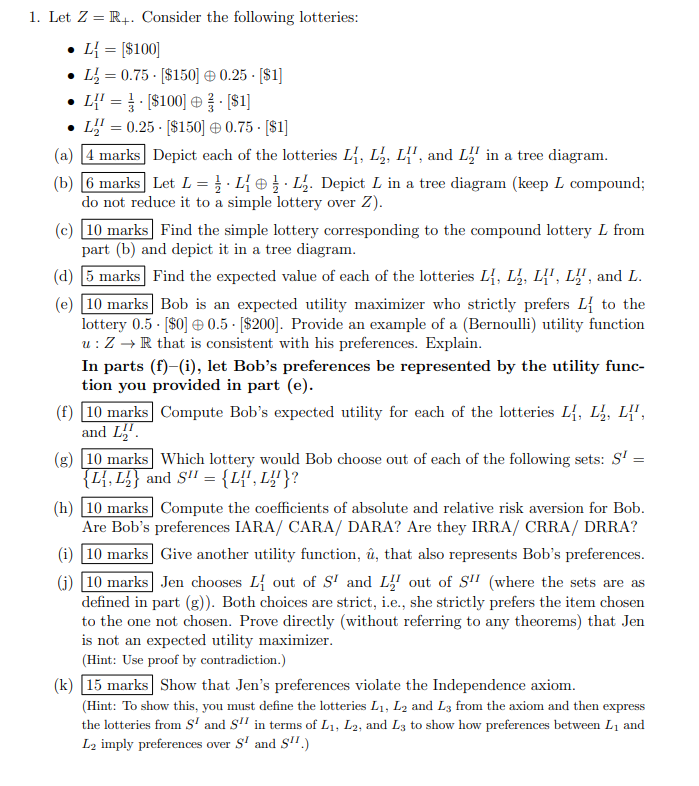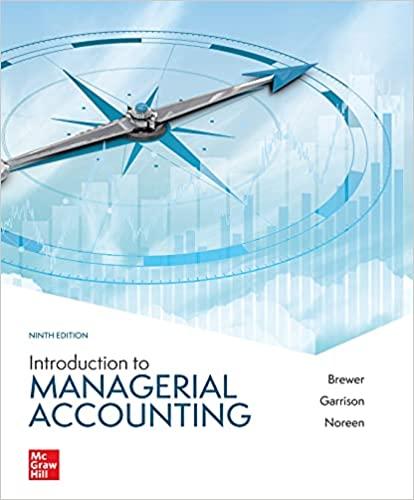
. 1. Let Z=R. Consider the following lotteries: L} = ($100] L = 0.75 - [$150) 0.25 - [$1] L' = [$100] e } - ($1] L = 0.25 [$150] 0.75. [$1] (a) 4 marks Depict each of the lotteries L}, L, L", and l in a tree diagram. (b) 6 marks Let L = 1.1. L. Depict L in a tree diagram (keep L compound; do not reduce it to a simple lottery over 2). (c) 10 marks Find the simple lottery corresponding to the compound lottery L from part (b) and depict it in a tree diagram. (d) 5 marks Find the expected value of each of the lotteries L}, LJ, L', L., and L. (e) 10 marks Bob is an expected utility maximizer who strictly prefers L{ to the lottery 0.5 - [$0] > 0.5 - [$200]. Provide an example of a (Bernoulli) utility function u: 2 + R that is consistent with his preferences. Explain. In parts (f)-(i), let Bob's preferences be represented by the utility func- tion you provided in part (e). (f) 10 marks Compute Bob's expected utility for each of the lotteries L, L, L'", and LT (g) 10 marks which lottery would Bob choose out of each of the following sets: S' = {Z, Lj} and SII = {L", L}? (h) 10 marks Compute the coefficients of absolute and relative risk aversion for Bob. Are Bob's preferences IARA/ CARA/ DARA? Are they IRRA/ CRRA/ DRRA? (i) 10 marks Give another utility function, , that also represents Bob's preferences. (1) 10 marks Jen chooses l_ out of S! and Lout of Sul (where the sets are as defined in part (g)). Both choices are strict, i.e., she strictly prefers the item chosen to the one not chosen. Prove directly (without referring to any theorems) that Jen is not an expected utility maximizer. (Hint: Use proof by contradiction.) (k) 15 marks Show that Jen's preferences violate the Independence axiom. (Hint: To show this, you must define the lotteries L1, L2 and L3 from the axiom and then express the lotteries from S' and sh in terms of L1, L2, and L3 to show how preferences between L, and L2 imply preferences over S and S) . 1. Let Z=R. Consider the following lotteries: L} = ($100] L = 0.75 - [$150) 0.25 - [$1] L' = [$100] e } - ($1] L = 0.25 [$150] 0.75. [$1] (a) 4 marks Depict each of the lotteries L}, L, L", and l in a tree diagram. (b) 6 marks Let L = 1.1. L. Depict L in a tree diagram (keep L compound; do not reduce it to a simple lottery over 2). (c) 10 marks Find the simple lottery corresponding to the compound lottery L from part (b) and depict it in a tree diagram. (d) 5 marks Find the expected value of each of the lotteries L}, LJ, L', L., and L. (e) 10 marks Bob is an expected utility maximizer who strictly prefers L{ to the lottery 0.5 - [$0] > 0.5 - [$200]. Provide an example of a (Bernoulli) utility function u: 2 + R that is consistent with his preferences. Explain. In parts (f)-(i), let Bob's preferences be represented by the utility func- tion you provided in part (e). (f) 10 marks Compute Bob's expected utility for each of the lotteries L, L, L'", and LT (g) 10 marks which lottery would Bob choose out of each of the following sets: S' = {Z, Lj} and SII = {L", L}? (h) 10 marks Compute the coefficients of absolute and relative risk aversion for Bob. Are Bob's preferences IARA/ CARA/ DARA? Are they IRRA/ CRRA/ DRRA? (i) 10 marks Give another utility function, , that also represents Bob's preferences. (1) 10 marks Jen chooses l_ out of S! and Lout of Sul (where the sets are as defined in part (g)). Both choices are strict, i.e., she strictly prefers the item chosen to the one not chosen. Prove directly (without referring to any theorems) that Jen is not an expected utility maximizer. (Hint: Use proof by contradiction.) (k) 15 marks Show that Jen's preferences violate the Independence axiom. (Hint: To show this, you must define the lotteries L1, L2 and L3 from the axiom and then express the lotteries from S' and sh in terms of L1, L2, and L3 to show how preferences between L, and L2 imply preferences over S and S)







